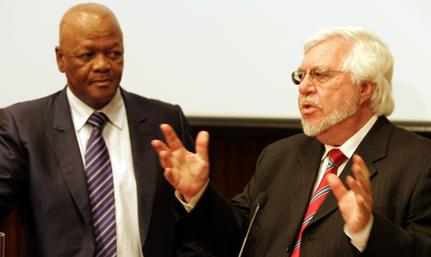Latest News Archive
Please select Category, Year, and then Month to display items
03 January 2023
|
Story Lacea Loader
|
Photo Evert Kleynhans
 Dr Dolf van Niekerk.
Dr Dolf van Niekerk.
The University of the Free State (UFS) would like to express its condolences to the family and friends of South African author, Dr Dolf van Niekerk, on his passing.
Dr Van Niekerk, the recipient of an
honorary doctorate from the UFS, passed away on 31 December 2022. The UFS awarded a Doctor of Letters to Dr Dolf van Niekerk during its April 2021 graduation ceremony.
Dr Van Niekerk was a celebrated author who also achieved fame as a dramatist and radio presenter. An alumnus of the UFS, he received a BA degree from the university cum laude in 1949. He also played a role in academia and was an emeritus professor at the University of Pretoria until his retirement in 1994. His work includes 27 books in philosophy, poetry, fiction, drama, and memoirs, for which he has received numerous awards. These include the
Eugene Marais Prize, the MER Prize, and the Scheepers Award for Youth Literature.
“Dr van Niekerk is a Kovsie alumnus with a deep connection to the Free State. He played a significant role in the country’s literary history, and it was an honour for the university to award him with an honorary degree. A wordsmith of note, Dr van Niekerk’s contributions to South African literature, radio, and stage will live on," says
Prof Francis Petersen, Rector and Vice-Chancellor.
Minister Jeff Radebe commends UFS for measures taken to address racial prejudices
2013-10-21
|
 |
| 18 October 2013 |
Mr Jeff Radebe, Minister of Justice and Constitutional Development, last night delivered a lecture in the Prestige series of the Dean: Faculty of Law, at the Bloemfontein Campus of the University of the Free State (UFS).
In a packed hall with, among others, university students, staff and members of the judicial system, Minister Radebe said that many other academic institutions should look to the UFS when they deal with the challenges of racism in its various manifestations in their midst. “I commend the university for taking drastic measures to address the challenges of racial prejudices in its own backyard,” he said.
“Government can and must provide leadership, but it is the collective efforts of all our people that will ensure that we bridge the racial and historical divides that stand in contrast to our noble virtues as entailed in the Constitution,” the Minister said.
On the topic “Access to Justice” the Minister said that the Department of Justice and Constitutional Development has channelled more than 80% of its nearly R16 billion budget to the Access to Justice programme.
Minister Radebe talked about the reintroduction of the Sexual Offences Courts, which attests to the unrelenting resolve to eliminate the scourge of gender-based violence. “Fifty-seven of the department’s Regional Courts are being upgraded to operate as dedicated Sexual Offences courts during the 2013/2014 financial year. We believe that these sexual offences courts will help address the growing challenge of sexual offences in the country, particularly against vulnerable groups.”
The Minister also pleaded with law teachers to avail themselves to preside in the courts in our country to complement the decreasing number of presiding officers that are drawn from the attorneys’ and advocates’ profession. These services are normally rendered by the Commissioners pro bono as part of an endeavour to bring justice to all the people, including the poor.
A challenge that the UFS could help resolve,is the transformation of the legal profession. “We need to increase the number of Law students and in turn increase the number of attorneys and advocates in the pool from which we derive candidate judges,” Mr Radebe said.
The Legal Practice Bill and the transformation of the State Legal Service are the most important initiatives underway by which the Institutions of Higher Learning will make a contribution. “The Bill seeks to establish a single regulatory structure, which will be responsible for setting the norms and standards for all legal practitioners. Members of the public, as primary beneficiaries of the legal profession, will also be represented in this structure. Other important objectives of the Bill are the removal of barriers of entry to the profession for young law graduates who aspire to pursue a legal career, and the introduction of measures aimed at ensuring that fees chargeable for legal services are reasonable and within reach of ordinary citizens,” he said.
The Minister concluded: “Our courts must reflect both the race and gender demographics of our country and so must the university communities in their various capacities as a microcosm of the society we seek to build.”